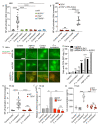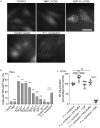Fusobacterium nucleatum promotes inflammatory and anti-apoptotic responses in colorectal cancer cells via ADP-heptose release and ALPK1/TIFA axis activation
- PMID: 38126163
- PMCID: PMC10761154
- DOI: 10.1080/19490976.2023.2295384
Fusobacterium nucleatum promotes inflammatory and anti-apoptotic responses in colorectal cancer cells via ADP-heptose release and ALPK1/TIFA axis activation
Abstract
The anaerobic bacterium Fusobacterium nucleatum is significantly associated with human colorectal cancer (CRC) and is considered a significant contributor to the disease. The mechanisms underlying the promotion of intestinal tumor formation by F. nucleatum have only been partially uncovered. Here, we showed that F. nucleatum releases a metabolite into the microenvironment that strongly activates NF-κB in intestinal epithelial cells via the ALPK1/TIFA/TRAF6 pathway. Furthermore, we showed that the released molecule had the biological characteristics of ADP-heptose. We observed that F. nucleatum induction of this pathway increased the expression of the inflammatory cytokine IL-8 and two anti-apoptotic genes known to be implicated in CRC, BIRC3 and TNFAIP3. Finally, it promoted the survival of CRC cells and reduced 5-fluorouracil chemosensitivity in vitro. Taken together, our results emphasize the importance of the ALPK1/TIFA pathway in Fusobacterium induced-CRC pathogenesis, and identify the role of ADP-H in this process.
Keywords: ALPK1; Fusobacterium; NF–κB; colorectal cancer.
Conflict of interest statement
No potential conflict of interest was reported by the author(s).
Figures







References
-
- Thomas AM, Manghi P, Asnicar F, Pasolli E, Armanini F, Zolfo M, Beghini F, Manara S, Karcher N, Pozzi C, et al. Metagenomic analysis of colorectal cancer datasets identifies cross-cohort microbial diagnostic signatures and a link with choline degradation. Nat Med. 2019;25(4):667–678. doi: 10.1038/s41591-019-0405-7. - DOI - PMC - PubMed
-
- Wirbel J, Pyl PT, Kartal E, Zych K, Kashani A, Milanese A, Fleck JS, Voigt AY, Palleja A, Ponnudurai R, et al. Meta-analysis of fecal metagenomes reveals global microbial signatures that are specific for colorectal cancer. Nat Med. 2019;25(4):679–689. doi: 10.1038/s41591-019-0406-6. - DOI - PMC - PubMed
-
- Allali I, Delgado S, Marron PI, Astudillo A, Yeh JJ, Ghazal H, Amzazi S, Keku T, Azcarate-Peril MA. Gut microbiome compositional and functional differences between tumor and non-tumor adjacent tissues from cohorts from the US and Spain. Gut Microbes. 2015;6(3):161–72. doi: 10.1080/19490976.2015.1039223. - DOI - PMC - PubMed
Publication types
MeSH terms
Substances
LinkOut - more resources
Full Text Sources
Medical
